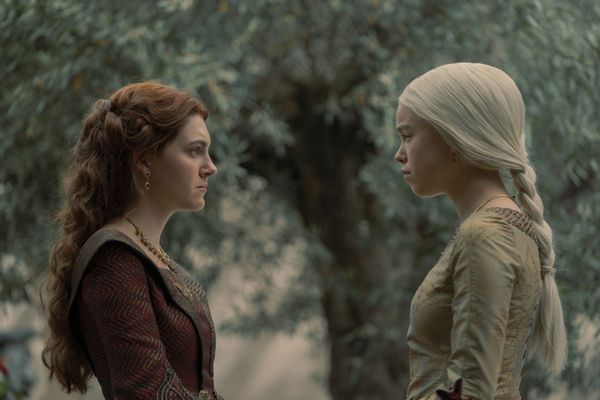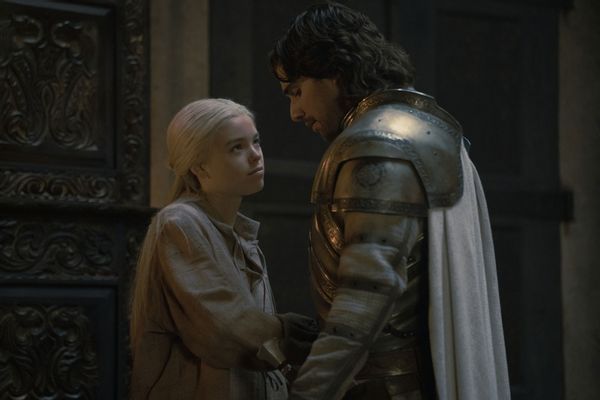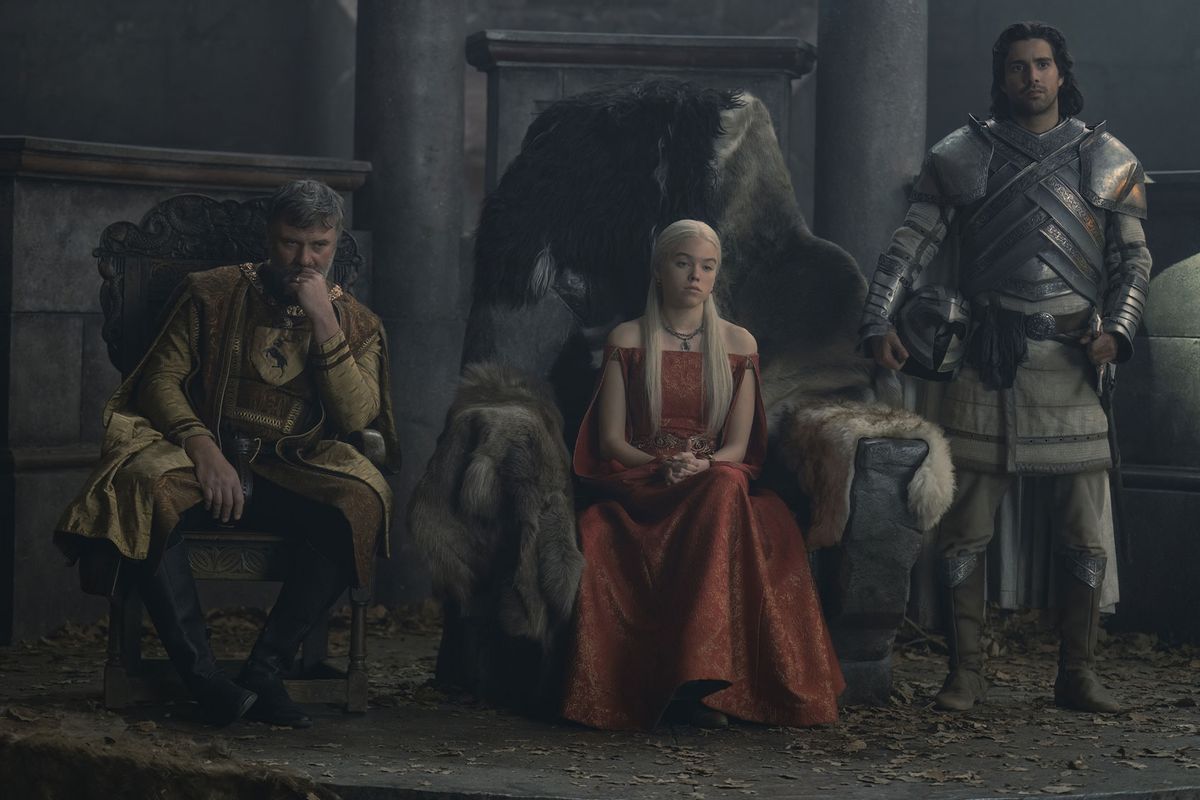The world of "Game of Thrones" has never been great about consent. HBO's "House of the Dragon" seems poised to have inherited (or technically, passed on, as the show is a prequel) that queasy legacy. The first of George R. R. Martin's television adaptions was marked by sexual violence and exploitation.
The creators of "House of the Dragon" swore a fresh slate. But we don't forget so easily. And it must be hard for the story to learn new tricks, as Episode 4 puts the evil in medieval, the dark in Dark Ages, and the bored in bordello. If you've been paying attention, you know incest is coming in the story but it's still nauseating in the episode, titled "King of the Narrow Sea," when Uncle Daemon (Matt Smith) takes his young niece Rhaenyra Targaryen (Milly Alcock) to a brothel and starts to seduce her.
Daemon never asks permission (that's for losers like House Stark) for anything he's done, so perhaps it's unsurprising that when he abruptly leaves her, mid-seduction, the princess proceedes to go home and have sex with Ser Criston Cole (Fabien Franke). Like her uncle, she does so without asking for consent, without asking anything. Not only that, but the older knight seems hesitant, downright reluctant, a reticence no doubt informed by the fact that the Kingsguard are supposed to be celibate. Does he feel as if his position is on the line? Does he have the right to say no to a princess?
Welcome to the first erosion of Rhaenyra's character, a destruction that proceeds as quickly and devastatingly as a figure from the King's model town, smashed to bits. What happened to the so-called strong woman of "House of the Dragon"? She doesn't live here anymore.
Salon's Melanie McFarland has written of some viewers' nauseating approval of the uncle/young niece couple. One thing behind that approval may be the idea that by taking control of her sexuality, Rhaenyra is owning it. This girl knows what she wants, etc. etc. But Rhaenyra is not taking control of her sexuality. Her older uncle is taking control of it for her, leading and molding her like a dragon he's trained.
Rhaenyra is not a creature to be broken, yet he treats her that way, with a downright collar. Could he be more transparent? Frustratingly, Rhaenyra puts up with it. She might not understand she's being taken advantage of by someone with years and power over her, but worse of all, she seems suddenly to crave it. The notion that a young girl would become sex-crazed after one night at a brothel with her creepy blood relation is offensive at best, and to connect a female character's strength to her sexuality is shoddy character development. Rhaenyra was strong before she forced a celibate knight to have sex with her. She rescued a dragon egg. She killed a wild boar. Sex doesn't make her strong. Strength makes her strong.
 Emily Carey and Milly Alcock on "House of the Dragon" (Ollie Upton / HBO)But that strength seems to be waning, as does her intelligence. After her wild night, Rhaenyra lies to Alicent (Emily Carey), previously her best friend and frankly, the only character in the whole kingdom she has any chemistry with. She puts the blame on Alicent's father, Otto Hightower (Rhys Ifans).
Emily Carey and Milly Alcock on "House of the Dragon" (Ollie Upton / HBO)But that strength seems to be waning, as does her intelligence. After her wild night, Rhaenyra lies to Alicent (Emily Carey), previously her best friend and frankly, the only character in the whole kingdom she has any chemistry with. She puts the blame on Alicent's father, Otto Hightower (Rhys Ifans).
One should never trust a celibate knight to bring the birth control.
His slimy character is nothing to write home about, but it's not like Rhaenyra to lie, especially not so boldly and dastardly, knowing her deceits will purposefully cause harm to another. If she doesn't care about Hightower, she does care for his daughter. It's not like Rhaenyra to hurt someone or something on purpose. The white hart chose her, and she was merciful enough to spare it. She swallowed her pain about her father marrying her friend, soon after the death of her mother. She did what was best for her family and protected others, including their feelings.
 Milly Alcock and Fabien Frankel in "House of the Dragon" (Ollie Upton / HBO)But Rhaenyra becomes irresponsible in a way wholly unlike the level-headed, caring and determined character, from small actions (reaching for a dagger in a fire) to big, such as failing to take steps before sex to prevent any "unwanted consequences." Yes, those steps existed even in pretend medieval times, and one should never trust a celibate knight to bring the birth control.
Milly Alcock and Fabien Frankel in "House of the Dragon" (Ollie Upton / HBO)But Rhaenyra becomes irresponsible in a way wholly unlike the level-headed, caring and determined character, from small actions (reaching for a dagger in a fire) to big, such as failing to take steps before sex to prevent any "unwanted consequences." Yes, those steps existed even in pretend medieval times, and one should never trust a celibate knight to bring the birth control.
Perhaps this character assassination is softening the blow for when the young actor will be taken from us.
Another example of Rhaenyra's eroding character is her quick agreement to marry the young man her father chooses. She agrees like it's no longer a big deal, all the fight — or caring — gone from her. All the fire extinguished. This from the brazen character who walked out on a hall full of waiting suitors, who left them behind without explaining herself or apologizing and boarded her damn ship. Where did that girl go?
Want a daily wrap-up of all the news and commentary Salon has to offer? Subscribe to our morning newsletter, Crash Course.
Perhaps this character assassination is softening the blow for when the young actor will be taken from us. After just one more episode, Rhaenyra (along with Alicent) will be played by a different, older actor. It will be a loss without the fierce performances of Alcock and Carey who we've grown to love, both better than their material, soaring above the trite dialogue like those dragons. But maybe that's for the best. The strong young woman we knew is gone.
"House of the Dragon" airs Sundays at 9 p.m. ET on HBO.
Read more
about "House of the Dragon"

Shares